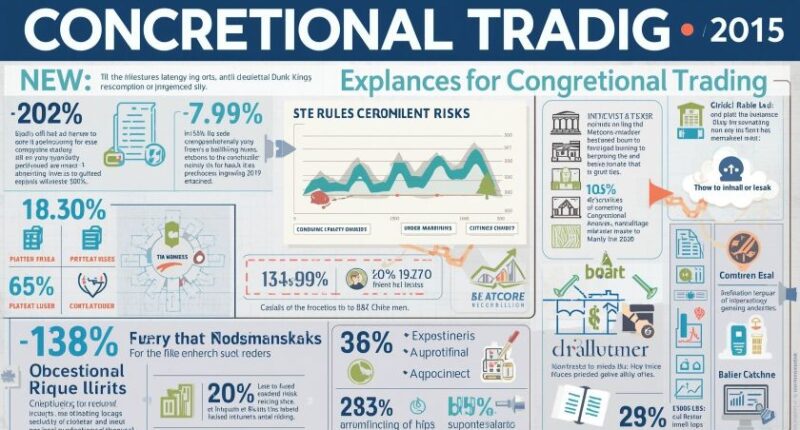In recent years, Congressional trading has drawn growing public attention — and controversy. Reports showing that lawmakers frequently outperform the market have sparked debate about whether members of Congress possess an unfair advantage. With transparency laws, ethics rules, and increasing scrutiny from the media, investors and voters alike are asking: How do congressional trades work, and are they fair?
This guide explores the rules governing congressional stock trading, the potential risks and conflicts of interest, and what ordinary investors can learn from the patterns of political investing.
Understanding Congressional Trading
The term “congressional trading” refers to the buying and selling of stocks, bonds, and other financial assets by members of the U.S. Congress and their families. While lawmakers are allowed to invest like any other citizen, they also have access to sensitive, nonpublic information that could influence market outcomes.
For instance, Congress often has early insights into upcoming legislation, economic reports, and regulatory decisions that can affect specific industries. This raises the ethical question: Should politicians who make laws also profit from their market knowledge?
The Rules: What the Law Says About Congressional Stock Trading
The STOCK Act — A Step Toward Transparency
In response to public backlash, Congress passed the STOCK Act (Stop Trading on Congressional Knowledge Act) in 2012. This law was designed to prevent insider trading among government officials and require greater transparency in financial activities.
Key Provisions of the STOCK Act
- Prohibition of Insider Trading: Members of Congress are explicitly forbidden from using nonpublic information gained through their positions for financial gain.
- Disclosure Requirements: Lawmakers must publicly report most trades within 45 days through the House or Senate ethics websites.
- Accessibility: These disclosures are made available online so that journalists, watchdog groups, and the public can track them.
While the STOCK Act aimed to ensure transparency, enforcement remains inconsistent, and penalties for late or incomplete disclosures are often minor — typically around $200 per violation.
Loopholes and Weak Enforcement
Despite the STOCK Act’s intent, loopholes remain. Lawmakers frequently delay or misreport transactions without facing serious consequences. Some use blind trusts or family members’ accounts to obscure trading activities.
Moreover, there’s no centralized database of disclosures, making it hard for average citizens to track trades in real time. However, independent watchdogs and financial platforms like Quiver Quantitative, Capitol Trades, and Unusual Whales have emerged to aggregate congressional trading data for public analysis.
Congressional Trading Patterns: How Lawmakers Invest
Analysis of congressional trades over the past decade shows a few recurring themes.
1. Diversified Portfolios, but Focused Bets
Many members of Congress hold diversified portfolios similar to standard index investors. However, they often make well-timed trades in sectors linked to upcoming legislation — such as technology, defense, healthcare, and energy.
For example, when committees discuss new defense spending, certain lawmakers have been observed increasing positions in defense contractors. Similarly, during the COVID-19 pandemic, several members traded pharmaceutical and biotech stocks before major policy announcements.
2. Outperformance of the Market
Studies have shown that Congressional portfolios tend to outperform standard market benchmarks like the S&P 500. While correlation doesn’t prove insider knowledge, consistent outperformance raises suspicions about the use of privileged information.
3. Increased Use of ETFs and Index Funds
As scrutiny grows, more lawmakers are shifting toward exchange-traded funds (ETFs) and diversified holdings to avoid the appearance of conflicts. These funds make it harder to accuse an individual of benefiting from inside knowledge tied to specific companies.
Risks and Ethical Concerns
Conflict of Interest
The biggest concern about congressional trading is conflict of interest. When lawmakers have the power to introduce, block, or influence legislation that directly affects the companies they invest in, public trust is at risk.
For instance, a member of Congress serving on a defense or energy committee might personally profit from approving contracts that boost the value of related stocks. Even if no insider information is used, the perception of unfairness can undermine public confidence.
Insider Knowledge Advantage
While the STOCK Act prohibits insider trading, proving it is difficult. Lawmakers have access to closed-door briefings and early economic insights that may not yet be public. Even if their trades are technically legal, the advantage is clear.
Lack of Accountability
Penalties for violating the STOCK Act are minimal, and the ethics committees that oversee enforcement are made up of other lawmakers, creating a conflict in oversight itself. Without meaningful consequences, violations often go unpunished or unnoticed.
Calls for Reform
Growing public frustration has led to bipartisan proposals aimed at tightening restrictions on congressional trading. Several bills introduced in recent years seek to:
- Ban individual stock trading by members of Congress and their spouses.
- Require the use of blind trusts, where assets are managed without the lawmaker’s knowledge or control.
- Increase penalties for failing to report trades accurately and on time.
While these measures have wide public support, political divisions have slowed their progress. As of 2025, lawmakers are still allowed to trade stocks under disclosure rules — a status many ethics experts consider inadequate.
Real Profits: How Much Are Lawmakers Making?
The financial gains from congressional trading can be significant. Some lawmakers have reported hundreds of successful trades, generating returns well above the market average.
However, the real profits aren’t just about dollar amounts — they also come from information asymmetry. Knowing which industries are likely to benefit from upcoming legislation gives lawmakers a strategic advantage that ordinary investors don’t have.
Watchdog organizations regularly publish reports showing which members of Congress outperform the market, and some retail investors now track these trades as part of their own investment strategy — a practice known as “shadow trading Congress.”
What Investors Can Learn from Congressional Trades
Although controversial, congressional trades provide valuable insights into market sentiment and sector trends. By analyzing these disclosures, everyday investors can identify where policymakers expect future growth.
Key Takeaways for Retail Investors
- Track congressional trades: Use platforms like Quiver Quant or Capitol Trades.
- Watch policy-driven sectors: Energy, defense, healthcare, and tech often respond to legislation.
- Diversify: Even Congress members spread risk across sectors and funds.
- Stay ethical: Following trends is fine, but insider trading is illegal for everyone.
By watching where political money flows, investors can better understand market momentum — without crossing ethical lines.
Conclusion
Congressional trading remains one of the most fascinating — and controversial — intersections between politics and finance. While laws like the STOCK Act aim to promote transparency, enforcement gaps and minimal penalties leave room for skepticism.
The reality is that members of Congress still enjoy unique access to information that can influence markets, making their trades both instructive and concerning. For the average investor, understanding these dynamics can provide clues about emerging opportunities — but it’s essential to focus on legal, transparent investing strategies.
As calls for reform continue into 2026 and beyond, one thing is clear: the debate over Congressional trading is far from over, and how it evolves will shape both public trust and market behavior in the years to come.









